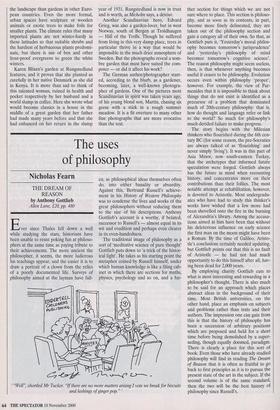The uses of philosophy
Nicholas Fearn
THE DREAM OF REASON by Anthony Gottlieb Allen Lane, £20, pp. 480 Ever since Thales fell down a well while studying the stars, historians have been unable to resist poking fun at philoso- phers at the same time as paying tribute to their achievements. The more ancient the philosopher, it seems, the more ludicrous his teachings appear, and the easier it is to draw a portrait of a clown from the relics of a poorly documented life. Surveys of philosophy aimed at the layman have fall- en, as philosophical ideas themselves often do, into either banality or absurdity. Against this, Bertrand Russell's achieve- ment in his History of Western Philosophy was to condense the lives and works of the great philosophers without reducing them to the size of his descriptions. Anthony Gottlieb's account is a worthy, if belated, successor to Russell's — almost equal in its wit and erudition and perhaps even clearer in its even-handedness.
The traditional image of philosophy as a sort of 'meditative science of pure thought' Gottlieb puts down to 'a trick of the histor- ical light'. He takes as his starting point the metaphor coined by Russell himself, under which human knowledge is like a filing cab- inet in which there are sections for maths, physics, psychology and so on, and a fur-
' "Well", chortled Mr Tucker. "If there are no more matters arising I vote we break for biscuits and lashings of ginger pop." ' ther section for things which we are not sure where to place. This section is philoso- phy, and as soon as its contents, in part, become more finely delineated, they are taken out of the philosophy section and gain a category all of their own. So that, as Gottlieb puts it, 'Yesterday's moral philos- ophy becomes tomorrow's jurisprudence' and 'yesterday's philosophy of mind becomes tomorrow's cognitive science'. The reason philosophy might seem useless, then, is that whenever anything becomes useful it ceases to be philosophy. Evolution occurs even within philosophy 'proper', however. For example, the view of Par- menides that it is impossible to think about things that do not exist is identified as a precursor of a problem that dominated much of 20th-century philosophy: that is, how do thought and language refer or link to the world? So much for philosophy's much derided failure to make progress.
The story begins with the Milesian thinkers who flourished during the 6th cen- tury BC (for some reason, the pre-Socratics are always talked of as 'flourishing' and never simply 'living). It was in this part of Asia Minor, now south-eastern Turkey, that the archetypes that informed future speculation were forged. Gottlieb always has the future in mind when recounting history, and concentrates more on their contributions than their follies. The most notable attempt at rehabilitation, however, is devoted to Aristotle. Most undergradu- ates who have had to study this thinker's works have wished that a few more had been shovelled onto the fire in the burning of Alexandria's library. Among the accusa- tions aimed at him have been that without his deleterious influence on early science the first man on the moon might have been a Roman. By the time of Galileo, Aristo- tle's conclusions certainly needed updating, but Gottlieb points out that this is no fault of Aristotle — he had not had much opportunity to do this himself after all, hav- ing been dead for 2,000 years.
By employing charity Gottlieb cuts to what is most interesting and rewarding in a philosopher's thought. There is also much to be said for an approach which places abstract ideas in the background of their time. Most British universities, on the other hand, place an emphasis on subjects and problems rather than texts and their authors. The impression one can gain from this is that the history of philosophy has been a succession of arbitrary positions which are proposed and held for a short time before being demolished by a super- seding, though equally doomed, paradigm. There is clearly a place for this sort of book. Even those who have already studied philosophy will find in reading The Dream of Reason that it is often as fruitful to go back to first principles as it is to pursue the present state of the art in the subject. If the second volume is of the same standard, then the two will be the best history of philosophy since Russell's.


































































































 Previous page
Previous page